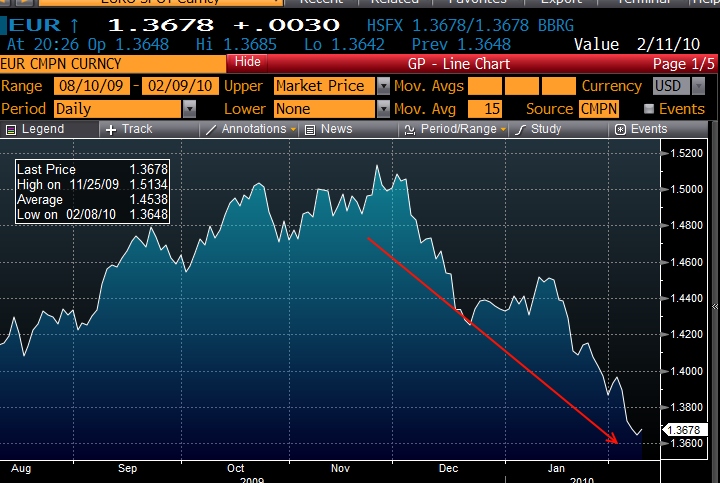The European Union was established as a massive economic experiment in 1993 in order to unite its smaller member countries for economic gain and to establish a seat as a major world power. There are currently 27 member countries of the European Union with over 500M citizens speaking 23 different languages and living by the motto, “United in Diversity”. As an economic power the conglomerate makes up about 30% of world GDP in nominal terms which often ranks it as the largest “single” contributor to world output. Of the 27 member countries, 16 have adopted a common currency, the Euro (€).
So to sum it up, 27 member countries are united under 27 national governments, 27 cultural histories, 23 languages, 12 central banks, 12 currencies, and no less than 10 major religions. None of these individually is probably as uniting as the 27 national football teams…
The default of Greece that I have been bringing up for months is not catastrophic in and of itself. Greece is the 27th largest economy in the world and could easily default without causing a world crisis. The fear comes with the domino effect within the European Union and specifically the 16 countries using the Euro in the Eurozone. Being tied to a single currency means that you are just as strong or as weak as your weakest members. If Greece is allowed to default, then Portugal might be next, then Spain, then Ireland or Italy. The default of one might be manageable, but the signal of one default would put the gun-sites on the next which would be devastating to the Euro currency.
In some ways, the speculations surrounding European defaults have been good for members of the Eurozone. A falling Euro helps ailing European economies recover by making goods cheaper to foreign buyers. Germany is more than happy to see its currency weaken to the benefit of its exports. Currencies which are allowed to float often right the wrongs and imbalances created by their governments.
Unfortunately, there is a vast difference between a weakening currency and a currency crisis. The default of Greece would cause the latter, which would put Germany and France in very tenuous economic circumstances. Therefore, what we are likely to see is that the countries at the bottom of the list above will be more or less bailing out the countries at the top of the list. This will likely create a vehement public outcry from the citizens of Germany, France, Belgium, the Netherlands, and the other countries who were coerced into helping their suffering neighbors.
The Eurozone was an untested experiment which will be marked as such in history. Countries remain independent nations for a reason, because they are mainly interested in the wealth and happiness of their own citizens. Germany and France will reluctantly bailout their neighbor countries, but the return of the Franc and the Deutsche Mark can only be a few years down the road. Americans might cry out about the unfairness of the bankers’ bailouts, but at least the money is being redistributed to fellow Americans.





